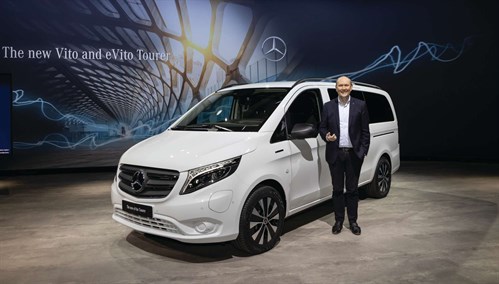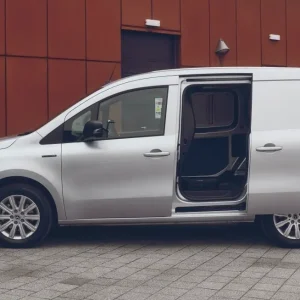It’s funny how quickly the message can change when you no longer have to toe the party line.
In 2017, when the Mercedes-Benz X-Class was launched, there were not enough superlatives available to throw at the vehicle and how important it would be for the Mercedes brand across the world. Sales would, it was said, place it as one of the most important vehicles in the sector. Just over two years after its launch, however, and the noises from Stuttgart are already sounding different.
Head of Mercedes-Benz Vans, Marcus Breitschwerdt, took over from lifelong Mercedes man Volker Mornhinweg on 1 May 2019 having previously been head of marketing and sales for Mercedes-Benz Cars Europe, where he presumably would have been party to discussions over the apparent tug-of-war over where the X-Class would sit in the MB family.
Commercial vehicles won that internal battle, and while the X-Class might not have won the war, or even many followers, it allowed Breitschwerdt to now label it as “a bit of a Harley Davidson of the van division”. Whether or not the flashy X-Class legacy will be comparable to the most successful motorbike brand of all time in years to come will remain to be seen, but its 2,000 sales in the UK and the significant €3.1bn loss achieved by the Mercedes van division in 2019 does not set the X-Class’s stall out as one of the misunderstood masterpieces of its generation.
“The balance sheet, closing 2019, doesn’t look great,” Breitschwerdt says. “I don’t want to overdo it but we had some one-timers [costs] that are not regular business, one point being the fact that we have done a review of our portfolio and came to the conclusion that after the Latin American introduction of the X-Class was cancelled for business reasons, and that the X-Class has been a niche model, it is prudent to stop production and exit the segment by May. That comes with a price tag.”
The cost of the withdrawal from the market is one thing, but the price of the X-Class was perhaps the greatest talking point surrounding the model. While top-end units started from £38,350 (excluding VAT), even an entry-level X-Class would set you back £27,000. Timing was possibly also an issue and in its eagerness to capitalise on a booming market for pick-up trucks worldwide (the UK alone registered nearly 55,000 the year of the X-Class’s launch) it felt like the introduction of the X220d and X250d was hurried, essentially labelling it as a rebadged Nissan Navara, rather than marking out the fire-breathing V6 model as something very different to its stablemate.
Is it possible the lesser models tainted the impact of the more complete, and impressive, X350d, which arrived several months later? The X350d did, after all, incorporate Mercedes’ own V6 engine and a large proportion of its own technology and know-how in fine-tuning the driving experience, yet sales across the models were fairly even, demonstrating that some customers were perhaps willing to pay over the odds for the prestigious Mercedes badge. Sales were, however, a disappointment.
“It didn’t pull enough Mercedes customers into our showrooms and, honestly speaking, the price point might also have played a role,” Breitschwerdt says. “It is a niche model … [because] if a landscaper needs an open-back model you buy a Sprinter van with a flat back. For a functional commercial vehicle the American habit [of pick-up trucks] is not as much of a success model in Europe. It was a good decision to call it a day,” Breitschwerdt adds.


Breitschwerdt says that Mercedes has ‘an overall electrification strategy’
(Continued from page 1) Breitschwerdt wouldn’t say exactly how much the X-Class adventure cost Mercedes, but investment in products and the need to speed up its electrification strategy likely played a part in the enormous losses for the year, although the brand continued to sell well and recorded a seventh consecutive year of record sales, with almost 440,000 units sold worldwide.
The UK market was up 10% to 44,500 units, while sales in Europe also grew by 7%, finishing on close to 300,000. However, the largest gains came in North America, where 46,000 Mercedes commercial vehicles were sold, an increase of 18%.
“We face many challenges and had to adjust our strategy last year,” Breitschwerdt says. “[There are] more rigid emission regulations – it’s the right thing to do – and we follow and have an overall electrification strategy for our portfolio, not only offering electric vans, but customised and more comprehensive solutions to help customers meet challenges in the best way possible.
“We had, in terms of sales, our best year ever and sold 440k units, up 4%, and a very strong performance in the US and good results in Europe. The beginning of the year has been encouraging. What is happening now with the current influence of the virus certainly is not fully predictable and it is too early to say what impact it will have on the year.”
Regardless of the effect of the pandemic, curbing losses may not prove easy in a sector where competitors are increasingly looking to merge or cooperate in order to spread the enormous costs of development for both cleaner diesel engines and future powertrains. Ford and Volkswagen are exploring a cooperation agreement, and PSA has tabled a bid for Fiat-Chrysler, creating two of the largest partnerships in the automotive landscape.
Mercedes, in contrast, has very few partnerships, with its Citan currently being the only shared product. That relationship with Renault is set to continue with the new model, when both combustion engine and electric-powered versions of the van will be produced.
Nevertheless, Breitschwerdt believes the business is in a strong position: “We are in strong cooperation. We are cooperating with Mercedes-Benz passenger cars and trucks. We can use the shelf [of parts] to the full degree, and we are cooperating on an ongoing basis with Renault for the next-generation Citan. We will have to wait and see what other manufacturers announce, but I think it’s okay to state that everybody looks around, and as with passenger cars and the industry as a whole we will take from time to time decisions whether to cooperate.”
While being typically tight-lipped about the future of Mercedes and its products, working with another manufacturer to share intellectual property or products remains an option, although Breitschwerdt light-heartedly names some alternatives at our suggestion of a collaboration.
“I wouldn’t rule out even a collaboration with Rolls-Royce. It could be extremely nice. Aston Martin would be my favourite one – they have our engines and it would give me even more of a reason to be in the UK.”
Comment: Is Merc too late to the e-party?
Sometimes new models bring on big change, but the minor revisions to the new Vito suggest that Mercedes isn’t one for a radical re-invention. Despite the new eVito and eVito Tourer (pictured on the opposite page) representing an important milestone for Mercedes-Benz Vans as the company’s first all-electric model, it does feel like Mercedes is arriving quite late to the party, something which Marcus Breitschwerdt, head of vans, denies.
“We always said we would run a propulsion and drivetrain strategy that will be flexible, and have an ongoing look at the ecological needs,” he tells What Van?, while also referencing that the brand has worked on consumer advice and connectivity solutions for its customers.
Electric Sprinter vans are scheduled to launch later this year and a new Citan will have an electric powertrain, but while Mercedes’ passenger siblings have already launched an EQ sub-brand with separate models of its own for its electric offering, Breitschwerdt says there are no plans for the same in vans, with the ‘e’ models of Citan, Vito and Sprinter currently the only ones in the alternative-drivetrain pipeline.
George Barrow is the UK judge for the International Van of the Year, the prestigious prize awarded by leading European LCV journalists.
Sponsored by:






